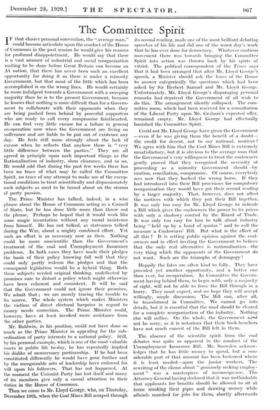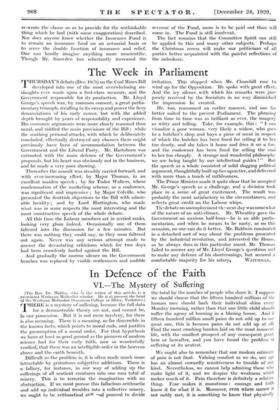The Committee Spirit
I F that elusive personal convention, the "average man," I could become articulate upon the conduct of the House of Commons in the past session he would give his reasons for profound disappointment. He would say that there is a vast amount of industrial and social reorganization waiting to be done before Great Britain can become an Al nation, that there has never been such an excellent opportunity for doing it as there is under a minority Government, but that most of the little which has been Accomplished is on the wrong lines. He would certainly be more indulgent towards a Government with a sweeping majority than he is to the present Government, because he knows that nothing is more difficult than for a Govern- ment to collaborate with their opponents when they are being pushed from behind by powerful supporters who are ready to call every compromise fainthearted. He can find very little excuse for a failure in general co-operation now when the Government are living on sufferance and are liable to be put out of existence any day. He feels still more strongly about the lack of excuse when he reflects that anyhow there is " very little difference between the parties." They are all agreed in principle upon such important things as the Rationalization of industry, slum clearance, and so on. He would add that during the past few weeks there has been no trace of what may be called the Committee Spirit, no trace of any attempt to make use of the excep- tional conditions to treat scientifically and dispassionately such subjects as used to be tossed about on the storms of party passion.
The Prime Minister has talked, indeed, in a wise phrase about the House of Commons acting as a Council of State, but he has done little more than throw out the phrase. Perhaps he hoped that it would work like some magic incantation without any moral insistence from himself. He has not talked, as statesmen talked during the War, about a mighty combined effort. Yet such an effort is as necessary now as then. Nothing could be more unscientific than the Government's treatment of the coal and Unemployment Insurance problems. In both cases they have made their pledges the basis of their policy knowing full well that they could only partly redeem the pledges and that the consequent legislation would be a hybrid thing. Both these subjects needed original thinking, undeflected by promises sure to distort a policy which might otherwise have been coherent and consistent. It will be said that the Government could not ignore their promises. We admit that ; we are merely tracing the trouble to its source. The whole system which makes Ministers the victims of direct electoral bargains in regard to money needs correction. The Prime Minister could, however, have at least invoked more assistance from the other parties.
Mr. Baldwin, in his position, could not have done so much as the Prime Minister in appealing for the sub- ordination of party interests to a national policy. Still, by his personal example, which is one of the most valuable assets in public life to-day, he has repeatedly implied his dislike of unnecessary partisanship. If he had been constituted differently he would have gone further and by the recognizable arts of leadership have enforced his will upon his followers. That has not happened. At the moment the Unionist Party has lost itself and many of its members give only a casual attention to their duties in the House of Commons.
Then we come to Mr. Lloyd George, who, on Thursday, December 19th, when the Coal Mines Bill scraped through its second reading, made one of the most brilliant debating speeches of his life and did one of the worst day's work that he has ever done for democracy. Whatever cautious movement there was towards bringing the Committee Spirit into action was thrown back by his spirts of vitriol. The political correspondent of the Times says that it had been arranged that after Mr. Lloyd George's speech, a Minister should ask the leave of the House to answer categorically the questions which had been asked by Sir Herbert Samuel and Mr. Lloyd George. Unfortunately, Mr. Lloyd George's disparaging personal remarks had deprived the Government of all wish to do this. The arrangement silently collapsed. The com- mittee room, which had been reserved for a consultation of the Liberal Party upon Mr. Graham's expected offer, remained empty. Mr. Lloyd George had effectually banished the Committee Spirit.
Could not Mr. Lloyd George have given the Government —even if he was giving them the benefit of a doubt— the credit for decent, not to say national, motives ? We agree with him that the Coal Mines Bill is extremely unsatisfactory, but it is obvious to the average man that the Government's very willingness to treat the coalowners gently proved that they recognized the necessity of proceeding as a minority Government should—by caution, conciliation, compromise. Of course, everybody sees now that they backed the wrong horse. If they had introduced into their Bill provisions for compulsory reorganization they would have got their second reading by a larger majority. That, however, does not affect the motives with which they put their Bill together. It was only too easy for Mr. Lloyd George to ridicule a Bill which gives the coalowners the power to fix prices with only a shadowy control by the Board of Trade. It was only too easy for him to talk about industry being " held up by a band of quotas " and to call the measure a Coalowners' Bill. But what is the effect of all this ? It is setting public opinion against the coal- owners and in effect inviting the Government to believe that the only real alternative is nationalization—the very thing which the opponents of the Government do not want. Such are the triumphs of demagogy !
Happily the fates are often kind to folly. They have provided yet another opportunity, and a better one than ever, for co-operation. In Committee the Govern- ment having behind them, to begin with, only a majority of eight, will not be able to force the Bill through in a hurry. They must expect, and we hope they will accept willingly, ample discussion. The Bill can, after all, be transformed in Committee. We cannot go into details, but it is essential that the road should be cleared for a complete reorganization of the industry. Nothing else will suffice. On the whole, the Government nce41 not be sorry, as it is notorious that their back-benchers have not much conceit of the Bill left in them.
The absence of the scientific spirit from the coal debates was quite as apparent in the conduct of the Unemployment Insurance Bill. Mr. Snowden acknow- ledges that he has little money to spend, but a con- siderable part of that amount has been bestowed where it is least needed—upon the junior workers. The rewriting of the clause about " genuinely seeking employ- ment " was a masterpiece of inconsequence. The Attorney-General having declared that it was unthinkable that applicants for benefits should be allowed to sit at home smoking their pipes and drawing money while officials searched for jobs for them, shortly afterwards re-wrote the clause so as to provide for the unthinkable thing which he had (with some exaggeration) described. Nor does anyone know whether the Insurance Fund is to remain an insurance fund on an actuarial basis or to serve the double function of insurance and relief. One can hardly imagine anything more unscientific. Though Mr. Snowden has reluctantly increased the revenue of the Fund, more is to be paid out than will come in. The Fund is still insolvent.
The fact remains that the Committee Spirit can still be applied to this and many other subjects.' Perhaps the Christmas recess will make our politicians of all parties better acquainted with the painful reflections of the onlookers.

































 Previous page
Previous page